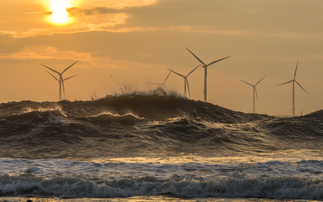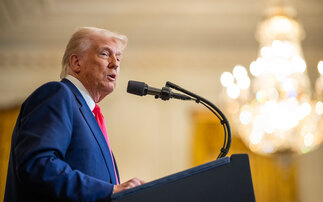The government's support for fracking is part of an economic and technological orthodoxy that has done the global economy few favours over the past decade - a change needs to come and the Paris Agreement can provide it
In the end it took less than 24 hours for Theresa May to tarnish her public commitment to the Paris Agreement.
Within hours of the news the treaty will come into force in early November, defying all experience of how long it takes to ratify an international agreement, the government gave the green light to shale gas drilling in the UK. On the same morning as the chances of Heathrow expansion received a further boost, the government underscored its plan to build an entirely new domestic fossil fuel industry, regardless of its stated desire to phase out the use of unabated fossil fuels in the UK.
A day after the ruling party gathered in Birmingham to hymn the virtues of putting people in control of their destiny, Communities Secretary Sajid Javid steamrollered local objections and the decision of democratically elected council representatives to impose fracking on Lancashire. The cognitive dissonance that allowed Theresa May to insultingly dismiss so many of her fellow global citizens while presenting herself as a healing force appears to be catching.
It is not all bad news. Looking at the fine print of the government's planning decision Javid bizarrely ruled his consideration of the emissions impact of the project should be limited to construction, operation and decommissioning. As such related issues like the UK's failure to provide carbon capture and storage capabilities and how shale gas development relates to our Paris Agreement obligations were deemed "a matter for future national policy and not these appeals".
Consequently, the government's commitment to the Paris Agreement stands and ministers will in the future have to deliver policies to honour it. Fracking has been given the green light, but without rapid progress on CCS and/or hydrogen that light will quickly turn to amber and then red - by 2030 for gas used for power generation and pretty soon thereafter for gas used for heat.
That anyone should want to invest in new fracking infrastructure in the UK when gas prices are in the doldrums, the government is clear there is no long term market for unabated fossil fuels (and no current plan for capturing fossil fuels), public opposition is considerable, and we still don't know if there is any extractable gas is one of many mysteries of the age.
The most likely answer is that fracking developers, knowing full well their investment will take years to pay back, are either heroically optimistic about the potential for clean technologies to mitigate their environmental impact or they think politicians are either liars who are unwilling to deliver on their climate change commitments or incompetents who are incapable of doing so. If it is the latter, Theresa May and co should feel belittled and insulted by the industry they are so keen to nurture.
In truth, the government's long-standing fixation with fracking is just one of many examples of how 20th century thinking has bled deep into the 21st century with potentially disastrous consequences.
As the famous old Chinese curse goes, "may you live in interesting times". Well, the times are certainly interesting and they are getting more interesting by the day. The jury is out on whether we are cursed.
From Donald Trump's free form racist utterances to Theresa May's embracing of nativist, populist tropes on immigration and Russia's transparent attempt to torch the post-Cold War order in Syria, the assaults on liberalism and collective global endeavour grow more confident by the day.
The only gossamer thin silver lining to this cloud is the quality of some of the writing it has produced, as journalists consider the terrifying parallels between the post-crash period and the 1920s and 30s. Nick Cohen's brilliantly prescient observations on the new politics of resentment have become essential reading, while Chris Deerin's recent lament on the fragility of civilisation in the face of populism should be read far and wide. Meanwhile, across the Atlantic the blistering critiques of Trump's dictator fan-boy persona almost make his campaign worthwhile - almost, but not quite.
Of course, we have to be careful with parallels to the 1930s. George Santayana was wrong, history never repeats itself, not exactly. A Great Depression was (just about) avoided, liberal and democratic values appear more entrenched than they were 90 years ago, technology has ushered in an era of transparency and full spectrum connectedness that, in theory at least, makes traditional nationalist propaganda less effective. Regardless of what Theresa May thinks many young people regard themselves as citizens of the world. The centre is holding (again, just about).
Then again, the leaders of the 1920s and 1930s did not have to combat sluggish economic growth, restive populations, and global environmental crisis (although a fascinating book is waiting to be written on the role localised environmental crises - toxic cities, air, and water - play in fuelling nationalism and conflict throughout history). The risk of things going south quickly appears more severe than at any point in my lifetime.
All of which is a roundabout way of getting back to the Paris Agreement and the cognitive dissonance that defines those governments and businesses that support the treaty while simultaneously mobilising fossil fuel investment and soft-pedalling on climate action.
If the lag between greenhouse gas emissions and their impact on the climate makes tackling climate change so intractable, it is more than matched in the economic sphere by the lag in economic thinking that followed the 2008 crash. To understand how governments and businesses around the world can usher through carbon intensive projects that are either completely incompatible with the Paris Agreement's goals or only compatible if you assume a level of technological optimism that borders on magical thinking, you need to understand the continued dominance of the orthodoxy surrounding technology choices, energy security, fossil fuel taxation, debt, and corporate short-termism that dominates so many treasuries and board rooms.
What is so exciting about the Paris Agreement - beyond the hope its paean to international co-operation offers a rebuttal to this era of wall-building and isolationism - is that it challenges this orthodoxy. As the hugely important New Climate Economy report details today, short term economic thinking and business-as-usual infrastructure decisions are now a recipe for slow growth, choked cities, and climate crisis, not to mention all the political instability that would come with that disastrous triumvirate.
There is no viable alternative for global political and business leaders than a shift to low carbon and sustainable infrastructure, enabled by new technologies and funded through a willingness to accept longer term returns (and supported by the potential shifting of some of the upfront costs, through low interest debt, onto the future generations that will benefit from liveable cities and a stable climate).
The great news is such an approach offers multiple co-benefits that extend far beyond tackling climate change and should make a sizeable contribution to tackling so many of the political and social challenges that are fuelling our age of anxiety.
The potential to ease air pollution and congestion, curb energy costs, and improve quality of life should all help provide a more optimistic vision for the future than one dominated by border guards and lists of foreign workers. The economic growth a clean infrastructure boom would unleash could limit the post-2008 years of stagnant wages and economic drift to a lost decade rather than a lost 20 years. More important still, the localised nature of the technology upgrades and infrastructure updates that are required should tackle a global environmental crisis while delivering a push back against the low wage globalisation trends that have fuelled anger across the west. You can't insulate a home from a call centre, you can't outsource wind and solar power.
An economic and technological blueprint that is largely compatible with the Paris Agreement is now readily available. All that is required is for political and business leaders to properly embrace it and draw a line through the orthodoxies they are so used to adhering to. As Theresa May observed yesterday, 'a change is going to come'. She should not be the one standing in the way of it.








